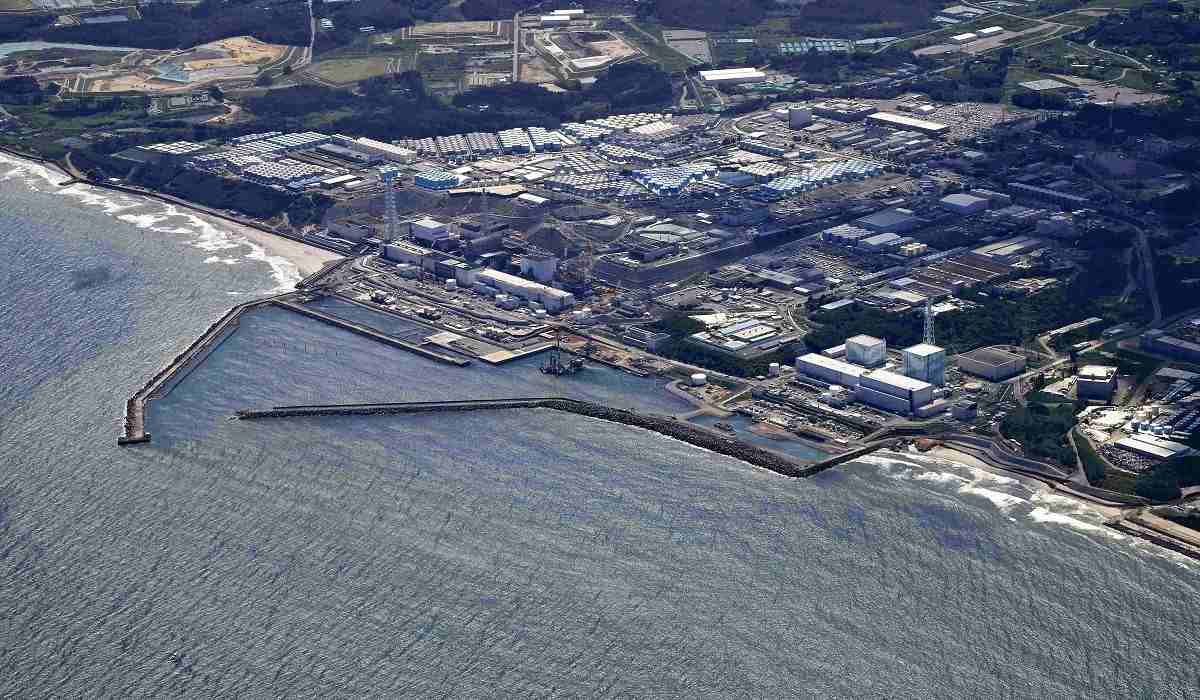Environment Ministry Finds Fukushima Treated Water Discharge Has No Environmental Impact; Russia, S. Korea Also Declare No Cause for Concern

The Fukushima No. 1 nuclear power plant is seen in August 2023 after the release of diluted treated water started.
6:00 JST, September 9, 2024
The Environment Ministry has confirmed there has been no impact on people or the environment following treated water discharge from the Fukushima No. 1 nuclear power plant over the past 12 months, according to findings from the ministry’s yearlong monitoring for radioactive materials in seawater near the plant and fish caught in the area.
No abnormalities have been found so far, and on Friday the ministry reported it to a meeting of an expert panel chaired by Takehiko Fukushima, professor emeritus at the University of Tsukuba.
Together with the ministry, seawater around the nuclear plant has been monitored by the Fisheries Agency, the Nuclear Regulation Authority, the Fukushima prefectural government and Tokyo Electric Power Company Holdings, Inc. They regularly collect seawater and fish samples, such as flatfish, and disclose the levels of radioactivity in those samples.
The process of discharging treated water began in August 2023. The water contamination occurred after being used to cool melted fuel in the 2011 nuclear accident at the plant, with most radioactive materials removed from the water except for tritium.
According to studies conducted by the ministry over the past year, the maximum tritium level was 5 becquerels per liter — much lower than 10,000 becquerels per liter, the maximum amount determined by the World Health Organization for safe drinking water. Other radioactive materials were below detectable levels, according to the ministry.
TEPCO has released a total of about 62,600 tons of treated water into the ocean and aims to complete the process over the next 30 years. The ministry and others will continue monitoring the area going forward.
Russia, S. Korea: No concerns
Regarding the treated water discharge, Russia and South Korea separately released findings from their own scientific surveys in late August, both concluding that there should be no concern.
The Pacific Oceanological Institute, part of the Russian Academy of Sciences’ Far Eastern Branch, released findings from their seawater examination conducted in the Far Eastern region, including the east of the Japanese archipelago, since 2022.
According to the institute, the average tritium level was about 0.12 becquerels per liter, which is much lower than Russia’s safety criteria of 7,700 becquerels per liter. The institute declared there would be no risk of eating seafood caught around Japan.
However, it also pointed out that long-term, continuous monitoring would be necessary for as long as the discharge of treated water continues.
In step with China, Russia has been restricting imports of Japanese fishery products since October. Russia says it will keep the restrictions in place until safety evaluations are performed. Tokyo will continue to request that Moscow lift the restrictions.
Meanwhile, the administration of South Korean President Yoon Suk Yeol maintains there is no safety issue provided there is scientific evidence. Seoul announced it conducted nearly 50,000 sample surveys in the waters around South Korea over the past year, concluding that there was no detection of tritium levels exceeding that of safety standards.
Top Articles in Science & Nature
-

Japan Institute to Use Domestic Commercial Optical Lattice Clock to Set Japan Standard Time
-

Japan to Face Shortfall of 3.39 Million Workers in AI, Robotics in 2040; Clerical Workers Seen to Be in Surplus
-

Record 700 Startups to Gather at SusHi Tech Tokyo in April; Event Will Center on Themes Like Artificial Intelligence and Robotics
-

iPS Treatments Pass Key Milestone, but Broader Applications Far from Guaranteed
-

iPS Cell Products for Parkinson’s, Heart Disease OK’d for Commercialization by Japan Health Ministry Panel
JN ACCESS RANKING
-

Japan PM Takaichi’s Cabinet Resigns en Masse
-

Japan Institute to Use Domestic Commercial Optical Lattice Clock to Set Japan Standard Time
-

Israeli Ambassador to Japan Speaks about Japan’s Role in the Reconstruction of Gaza
-

Man Infected with Measles Reportedly Dined at Restaurant in Tokyo Station
-

Videos Plagiarized, Reposted with False Subtitles Claiming ‘Ryukyu Belongs to China’; Anti-China False Information Also Posted in Japan






















